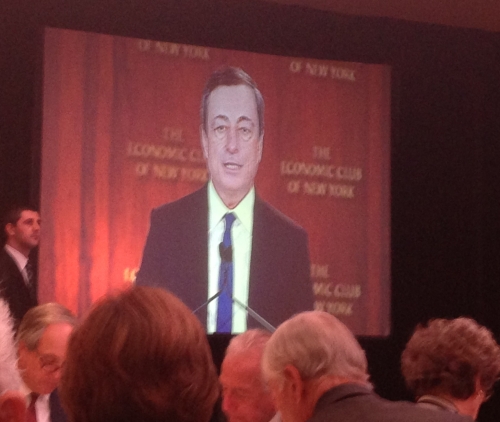
Yesterday in New York, Mario Draghi once again voiced the ECB stance that rate cuts were still very much on the table. You can read full story from Bloomberg (h/t Bud Spencer) shows it in a fuller light:“The Governing Council has unanimously agreed to incorporate an easing bias that explicitly provides for further rate reductions, should the volatility in money market conditions return to the levels observed in early summer,”
Now although he’s attached caveats to cutting rates, in my mind he is starting to increase the rhetoric and I don’t see the market taking notice. He’s always been dovish but his comments at previous meetings (prior to October’s) were far more balanced, in my opinion.
I’m wondering if I’m reading it all wrong. I’ve been tying the inflation issue to the rate cut talk and I heard someone reckoned that inflation figures are too lagging to come into the realm of possible ECB rate moves. I disagree because we’ve had around a years worth of trending lower inflation. That to me is not “inflation well anchored”
If I read him right then reader Bud Spencer is pulling more for deflation happening rather than just weak inflation;
I have a totally contrarian view to your inflation problem theory of the ECB. IMO; the ECB will not have an inflation problem for a very long time. Why? Very simple: wage inflation does not exist at all. The absolute opposite is the case: why do you think are countries like Germany shouting out the “internal devaluation discussion”? You got my point very quickly: it´s about lowering labor costs in the EU. You should rather mention “wage deflation” in your comments than wage inflation.
So am I reading too much into this or seeing rhetoric from Draghi that isn’t really there?
Have I got it spot on and am correct that the market isn’t seeing it (which is possible given the focus is on Washington)?
Am I underestimating the issue as Bud seems to suggest?

